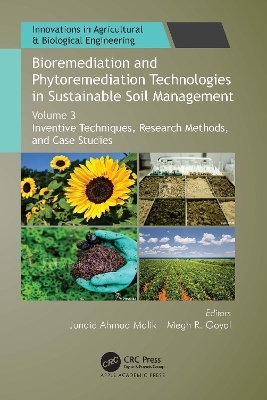
Bioremediation and Phytoremediation Technologies in Sustainable Soil Management
Apple Academic Press Inc. (Verlag)
978-1-77463-987-0 (ISBN)
Phytoremediation has evolved into an important tool to improve the bioremediation process since it is an innovative green technology that uses a wide variety of plants to remediate radioactive metals and elements, organics, and chemicals from soil, sediment, surface water, and groundwater environmental pollutants. Together, bioremediation and phytoremediation technologies provide an effective approach to contaminant abatement.
Volume 3 of the four-volume set identifies and draws a fresh image of existing developments in theoretical and functional implementation systems from recent scientific research studies that consider different facets of bioremediation. It also discusses the latest technology and prospects of new soil bioremediation technology and analyzes their domains, along with their associated challenges and consequences.
Other volumes in the 4-volume set:
• Volume 1: Fundamental Aspects and Contaminated Sites
• Volume 2: Microbial Approaches and Recent Trends
• Volume 4: Degradation of Pesticides and Polychlorinated Biphenyls
Together, these four volumes provide in-depth coverage of the mechanisms, advantages, and disadvantages of the bioremediation and phytoremediation technologies for safe and sustainable soil management. The diverse topics help to arm biologists, agricultural engineers, environmental and soil scientists and chemists with the information and tools they need to address soil toxins that are a dangerous risk to plants, wildlife, humans and, of course, the soil itself.
Junaid Ahmad Malik, PhD, is a Lecturer with the Department of Zoology at Government Degree College, Bijbehara, Kashmir (J&K), India. He has published research articles and technical papers in international journals and has authored and edited books, book chapters, and popular editorial articles. He also serves as an editor and reviewer for several journals. Megh R. Goyal, PhD, PE, is a prolific author and editor. He is a retired professor from the College of Engineering at the University of Puerto Rico. A former soil conservation inspector, Dr. Goyal was proclaimed as the “Father of Irrigation Engineering in Puerto Rico for the twentieth century” by the ASABE, Puerto Rico Section, for his pioneering work on micro irrigation, evapotranspiration, agroclimatology, and soil and water engineering.
PART 1: POTENTIAL OF PLANTS IN GREEN REMEDIATION 1. Bioremediation Potential of Pteridophytes 2. Potential of Ornamental Plants for Phytoremediation 3. Bioremediation Potential of Helianthus annuus 4. Potential of Biofertilizers for Soil Enhancement: Study on Growth, Physiological, and Biochemical Traits of Medicago sativa PART 2: TOOLS AND TECHNIQUES FOR BIOREMEDIATION 5. Fungal Nanoparticles for Soil Health and Bioremediation 6. Exploring Toxic Heavy Metals Using Engineered Nanomaterials via Immobilization 7. Vermicomposting and Its Role in Agricultural Waste Management 8. Applications of Horizontal Gene Transfer in Soil Bioremediation 9. In Vitro Screening of Heavy Metals: Seed Germination and Seedling Growth of Sorghum and Horse Gram 10. Potential of Agricultural Waste (Rice Husk and Sweet Lime Peel) in Bioremediation of Se (IV) Ions from Wastewater PART 3: REMEDIATION TECHNIQUES FOR SPECIAL SITES 11. Bioremediation of Polyethylenes and Plastics 12. Bioremediation of Pesticides Using Actinobacteria 13. Fungal Remediation Technology for Refinery Waste-Contaminated Soil 14. Biodegradation and Ecotoxicity of Petroleum Hydrocarbons: Methodology for Lab- and Field-Scale Studies 15. Bioreclamation of Sodic Soils for Sustainable Agriculture 16. Applications of Gut Microbiota of Insects in Degradation of Lignocellulosic Biomass 17. Plant Mediated Techniques in Detoxification of Mercury Contaminated Soils
| Erscheinungsdatum | 27.06.2022 |
|---|---|
| Reihe/Serie | Innovations in Agricultural & Biological Engineering |
| Zusatzinfo | 44 Tables, black and white; 2 Line drawings, color; 31 Line drawings, black and white; 12 Halftones, color; 10 Halftones, black and white; 14 Illustrations, color; 41 Illustrations, black and white |
| Verlagsort | Oakville |
| Sprache | englisch |
| Maße | 156 x 234 mm |
| Gewicht | 1002 g |
| Themenwelt | Schulbuch / Wörterbuch |
| Naturwissenschaften ► Biologie ► Botanik | |
| Weitere Fachgebiete ► Land- / Forstwirtschaft / Fischerei | |
| ISBN-10 | 1-77463-987-4 / 1774639874 |
| ISBN-13 | 978-1-77463-987-0 / 9781774639870 |
| Zustand | Neuware |
| Informationen gemäß Produktsicherheitsverordnung (GPSR) | |
| Haben Sie eine Frage zum Produkt? |
aus dem Bereich


